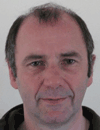Wednesday, 30 May 2012
08:00 | Registration | |||
09:30 | Overcoming the Challenges Facing Laboratory Integration | |||
Workflow Automation | Session Sponsors | |||
10:00 |
| |||
10:30 | Coffee Break and Networking in Exhibition Hall | |||
11:15 | BPM Technology as a Mechanism for Improvement of Automation Level in Life Sciences | |||
11:45 |
| |||
12:15 | Lunch Break and Networking in Exhibition Hall | |||
13:30 | Poster Viewing Session | |||
14:15 | UNICORE as a Tool for Processing the Data from GS FLX | |||
14:45 | Management and Automation System for Complete qPCR Diagnostics Workflow | |||
15:15 | Coffee Break and Networking in Exhibition Hall | |||
16:00 | Leveraging Image Analysis for use in Online Quantification of Drugs in Dried Sample Spots | |||
16:30 | Traceable Automated UV/Vis Quantification of Microliter DNA Samples | |||
17:00 | Drinks Reception | |||
Thursday, 31 May 2012
09:00 | Developing and Executing on a Lab Informatics Foundation for Global Growth | |
Cloud Computing in Automation | Session Sponsors | |
09:30 | Latest Laboratory Weather Forecast: More Clouds on the Horizon | |
10:00 | Interoperable Digital Identities and Signatures: Fundamental to Research Collaboration in the Cloud | |
10:30 | Coffee Break and Networking in Exhibition Hall | |
LIMS and ELN | ||
11:15 | LIMS in Lab Automation – Connecting the Laboratory | |
11:45 | Research Data Management in Academic Life Science Institutes – ELN and Image Management at VIB | |
12:15 | Lunch Break and Networking in Exhibition Hall | |
13:30 | Poster Viewing Session | |
14:15 | MAPS - A Specialized LIMS for R&D Laboratories | |
14:45 | From Smart Tea to Blog3: A story of Users, Laboratories and the Semantic Web | |
15:15 | Coffee Break and Networking in Exhibition Hall | |
15:45 | Close of Conference | |

